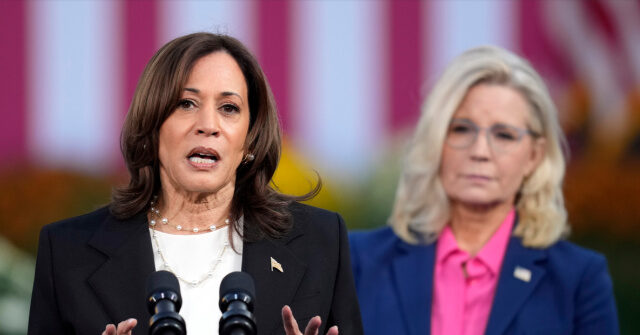In the lead-up to the recent Election Day, Vice President Kamala Harris seized upon comments made by former President Donald Trump regarding former Representative Liz Cheney, framing them as a violent threat. Trump, who has often criticized Cheney for her hawkish stance on military intervention, remarked on Truth Social that she would not have the courage to fight in wars she advocates for. He described Cheney as a “War Hawk” whose father contributed to significant violence in the Middle East. Trump’s comments, which were intended to spotlight what he perceives as the hypocrisy of politicians advocating for conflict from a safe distance, were misinterpreted by Harris as a call for violence against Cheney. She characterized Trump’s rhetoric as an escalation of political violence, arguing it disqualifies him from holding office.
Harris asserted that Trump suggested guns should be aimed at Cheney, promoting the idea that his language reflects a dangerous trend in American politics where adversaries are dehumanized. She emphasized Cheney’s patriotism and framed Trump’s rhetoric as an incitement to violence, which she deemed unacceptable for a former president. This characterization provoked backlash not only from Trump and his supporters but also from figures within the NeverTrump faction and establishment media, who felt that Herring’s interpretation misrepresented Trump’s comments and undermined political discourse.
Joe Walsh, a former Congressman, took to social media to clarify Trump’s position, emphasizing that Trump was not calling for violence against Cheney but rather criticizing her policy choices and questioning her credibility as a war advocate. Walsh pointed out that relying on clipped, sensationalized media interpretations distorts public understanding and diminishes the quality of political engagement. He condemned the political atmosphere where such misrepresentations thrive, contributing to a narrative that exaggerates threats in political discourse.
Zach Beauchamp from Vox also defended Trump, asserting that his comments should be understood within their broader context. He highlighted that Trump referred to Cheney as a “chickenhawk,” a term commonly used to describe those who support war but are not willing to enlist or fight themselves. By stating that someone wouldn’t put a weapon in someone’s hands if they were to face execution, Beauchamp argued that Trump’s remarks were misrepresented to incite outrage rather than provide an accurate account of his statements.
Columnist Kat Rosenfield further criticized the media for what she viewed as a deliberate misrepresentation of Trump’s comments. She argued that the suggestion of putting pro-war figures on the front lines of conflict does not equate to proposing violence against them, stressing the importance of honest journalistic practices. Her observations underscore a broader concern regarding the media’s role in shaping discourse through selective presentations of facts, potentially inflaming tensions in an already polarized political environment.
Amid these controversies, the discussion surrounding accountability in political rhetoric remains crucial. As politicians navigate the complexities of foreign policy and domestic conflict, the way they communicate their viewpoints holds significant implications. The misrepresentation of Trump’s comments by Harris and portions of the media highlights the fraught landscape of political dialogue, where soundbites can be weaponized in the fight for ideological supremacy. In this contentious atmosphere, there is an urgent need for clarity and integrity in reporting to ensure that political discussions can focus on substantive issues rather than sensationalized narratives that obscure the truth.

